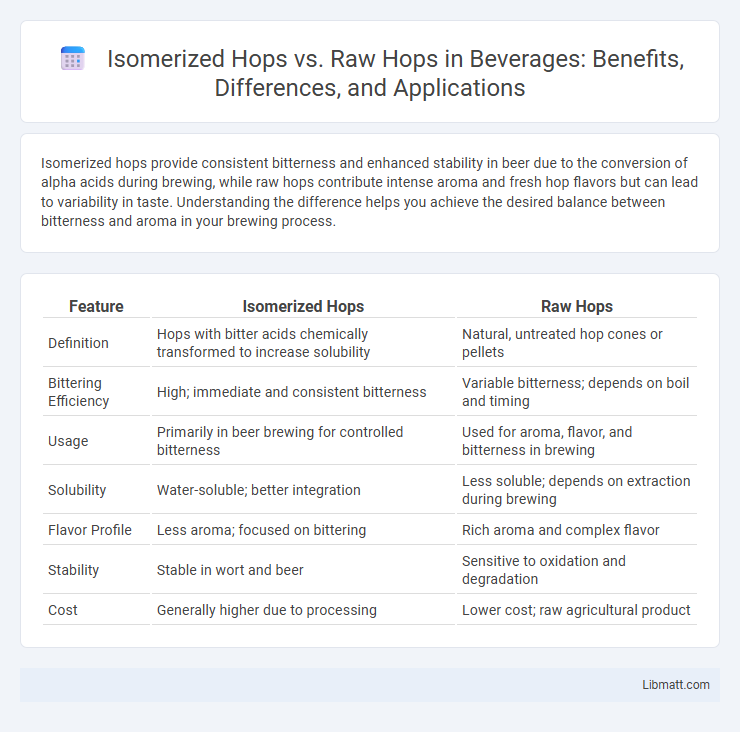Isomerized hops provide consistent bitterness and enhanced stability in beer due to the conversion of alpha acids during brewing, while raw hops contribute intense aroma and fresh hop flavors but can lead to variability in taste. Understanding the difference helps you achieve the desired balance between bitterness and aroma in your brewing process.
Table of Comparison
| Feature | Isomerized Hops | Raw Hops |
|---|---|---|
| Definition | Hops with bitter acids chemically transformed to increase solubility | Natural, untreated hop cones or pellets |
| Bittering Efficiency | High; immediate and consistent bitterness | Variable bitterness; depends on boil and timing |
| Usage | Primarily in beer brewing for controlled bitterness | Used for aroma, flavor, and bitterness in brewing |
| Solubility | Water-soluble; better integration | Less soluble; depends on extraction during brewing |
| Flavor Profile | Less aroma; focused on bittering | Rich aroma and complex flavor |
| Stability | Stable in wort and beer | Sensitive to oxidation and degradation |
| Cost | Generally higher due to processing | Lower cost; raw agricultural product |
Introduction to Hops in Brewing
Isomerized hops are hops that have undergone a chemical transformation during the boiling process, enhancing their bitterness and solubility in beer compared to raw hops. Raw hops contain alpha acids in their natural form, which requires isomerization through heat to release their bittering potential. Understanding the distinction between isomerized and raw hops is essential for brewers aiming to control flavor profiles and bitterness levels in beer production.
What Are Isomerized Hops?
Isomerized hops are hops that have undergone a chemical process called isomerization, converting alpha acids into iso-alpha acids, which are more soluble and contribute to beer bitterness. This process typically occurs when hops are boiled during brewing, enhancing bitterness stability and consistency compared to raw hops. Brewers use isomerized hops to precisely control bitterness levels and improve the overall flavor profile of the beer.
Understanding Raw (Non-Isomerized) Hops
Raw hops are the unprocessed cones harvested from the hop plant, containing alpha acids in their natural, non-isomerized form, which contribute to bitterness and aroma in beer. These alpha acids must undergo isomerization through the boiling process to convert into iso-alpha acids, the compounds responsible for the characteristic bitter taste and stability in beer. Understanding the chemical transformation from raw to isomerized hops is crucial for brewers aiming to control bitterness levels and flavor profiles in craft and commercial brewing.
The Science Behind Isomerization
Isomerized hops undergo a chemical transformation where alpha acids, primarily humulone, convert into iso-alpha acids through the process of heating during brewing, significantly increasing bitterness and hop stability in beer. Raw hops contain non-isomerized alpha acids that contribute minimal bitterness and are more susceptible to oxidation, leading to flavor degradation. The science behind isomerization is crucial for controlling beer bitterness and preserving hop aroma by stabilizing key bitter compounds.
Flavor Profiles: Isomerized vs Raw Hops
Isomerized hops undergo a chemical transformation during the brewing process, resulting in enhanced bitterness but a loss of many delicate aroma compounds found in raw hops. Raw hops contribute vibrant floral, citrus, and herbal flavors that are prized for fresh hop additions or dry hopping, while isomerized hops primarily impart stability and consistent bitterness to your beer. Choosing between isomerized and raw hops depends on whether you prioritize bold bitterness or complex hop-derived aromas in your brew.
Bitterness and Aroma Differences
Isomerized hops provide a consistent, well-defined bitterness due to the conversion of alpha acids when boiled, making them ideal for precise bitterness control in brewing. Raw hops contribute complex aromatic compounds and essential oils that enhance your beer's aroma but offer less predictable bitterness intensity. Understanding the balance between isomerized and raw hops allows you to optimize both bitterness clarity and aromatic depth in your craft beer.
Brewing Applications: When to Use Each Type
Isomerized hops are ideal for brewing when a clean, consistent bitterness is desired, as the isomerization process converts alpha acids into iso-alpha acids that dissolve easily during boiling. Raw hops offer a fresh, aromatic profile, making them perfect for late-addition or dry hopping to enhance your beer's aroma without significantly increasing bitterness. Your choice depends on whether you prioritize precise bitterness control with isomerized hops or vibrant hop aroma with raw hops.
Efficiency and Consistency in Brewing
Isomerized hops provide superior efficiency in brewing by delivering concentrated alpha acids, which enhance bitterness extraction compared to raw hops. This process ensures greater consistency in flavor and bitterness levels, reducing batch-to-batch variability. Brewers prefer isomerized hops for predictable results and streamlined production workflows.
Impact on Shelf Life and Stability
Isomerized hops provide enhanced shelf life and stability compared to raw hops due to their increased resistance to oxidation and microbial spoilage. The isomerization process converts alpha acids into iso-alpha acids, which are more stable and less prone to degradation, thereby maintaining bitterness and flavor integrity over time. Raw hops, containing higher levels of unstable compounds like essential oils, tend to degrade faster, resulting in reduced shelf life and altered sensory characteristics in the final beer product.
Cost and Accessibility Considerations
Isomerized hops offer higher bitterness efficiency, reducing the quantity needed and potentially lowering overall costs compared to raw hops. Raw hops, while often more accessible for small-scale brewers, may incur higher usage amounts, increasing expenses and requiring more storage space. Cost-effectiveness depends on the brewing scale, with isomerized hops favored in commercial operations and raw hops preferred by craft brewers valuing flavor complexity.
Isomerized hops vs raw hops Infographic

 libmatt.com
libmatt.com